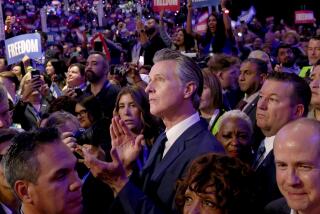Incoming N.Y. Governor Offers Olive Branch to Big Apple : Statehouses: George Pataki tones down campaign rhetoric, reaches out to Mayor Rudolph W. Giuliani, who endorsed Cuomo.
- Share via
NEW YORK — For George Pataki, New York’s Republican governor-elect, Wednesday was a day to bask in the political sunshine, savor triumph, pledge unity and offer an olive branch to old foes.
It was the same for the GOP in statehouse after statehouse. Republicans, who controlled 19 governor’s mansions before Tuesday’s voting, will be in charge in at least 29 next year, and perhaps as many as 31, depending on late returns.
Not one Republican incumbent governor lost, while three Democrats running for reelection were defeated--Mario M. Cuomo by Pataki in New York, Ann Richards by George W. Bush in Texas, and Bruce King by Gary Johnson in New Mexico. Of the three major state races where Democrats were incumbents--Florida, New York and Texas--Democrats won only Florida, where Lawton Chiles turned back challenger Jeb Bush.
Perhaps no race was more important to the Republicans than the New York contest, where Cuomo, a leading liberal, was seeking a fourth term. So on Wednesday, Pataki, an obscure 49-year-old state senator with an unpretentious manner, was hailed by his followers as a giant killer.
Flanked by the U.S. and New York state flags in the ballroom of a mid-Manhattan hotel, Pataki carefully avoided missteps, expressing his love for New York City and offering to work closely with Mayor Rudolph W. Giuliani, who broke party ranks to oppose Pataki in the election.
Pataki said he hadn’t spoken with the mayor yet. “I am sure he understands the difference between politics and policy. . . . There is no personal animosity,” he said. He also reaffirmed his promise to cut taxes 25% over four years, including 7.5% in the first year.
Exit polls indicated that the public was very tired of Cuomo. More than half of the people who cast their ballots for the conservative Republican candidate said they did so because they were voting against the three-term incumbent.
With such a fragile mandate and facing a divided Legislature (Democrats control the Assembly and Republicans the Senate) Pataki, the former mayor of Peekskill, N.Y., and a five-term legislator, quickly sought to lower the volume of his campaign rhetoric and seek consensus.
“I am going to be governor of all the state,” he said.
Pataki can anticipate at least one early major victory. In all likelihood, both houses of the Legislature will restore the death penalty and Pataki is expected to quickly sign the bill into law. Under Cuomo and his predecessor, Hugh Carey, governors vetoed the death penalty every year since 1977. The last electrocution in the state took place in 1963.
“I am hoping we will have the death penalty legislation passed early in our administration,” Pataki said.
With his declarations of concern for New York City, including a pledge to work at keeping subway and bus fares at current levels, Pataki moved early to try to avoid the battles that broke out between another Republican governor and a Republican mayor almost three decades ago. Those struggles between Gov. Nelson A. Rockefeller and Mayor John V. Lindsay deeply harmed the politicians, who both had presidential aspirations.
In the months to come, Pataki and Giuliani will be forced to negotiate a state aid package for the city. It could be tricky political balancing act for both men.
Giuliani’s endorsement of Cuomo temporarily revived the governor’s moribund campaign. But it also afforded Pataki a chance to play the city off against upstate regions, raising fears among voters that Cuomo had cut a special deal with the mayor that would harm upstate residents. The strategy was highly successful. Upstate voters turned out heavily to support Pataki.
As Pataki spoke at a news conference on Wednesday, his wife Elizabeth, who he met while body surfing in a storm on Long Island, stood at his side. They have four children.
A graduate of Yale University and Columbia Law School, Pataki returned to his roots in Peekskill, a small Hudson Valley city, after working in a Wall Street law firm. In Peekskill, he practiced law, accumulating wealth and power. His interest in Republican politics reaches back to the 1970s, when he worked to help elect Rockefeller.
Cuomo remained in seclusion Wednesday in the executive mansion in Albany. Even though he lost the governorship, his prospects were hardly bleak. The likelihood is he will be offered a lucrative partnership in a Manhattan law firm.
More to Read
Get the L.A. Times Politics newsletter
Deeply reported insights into legislation, politics and policy from Sacramento, Washington and beyond. In your inbox twice per week.
You may occasionally receive promotional content from the Los Angeles Times.










